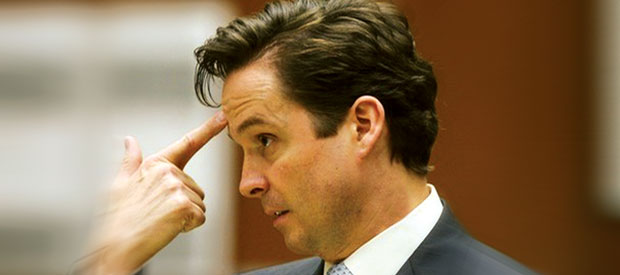Trying Times
Prosecutor Alan Jackson brings Phil Spector to justice with a long-awaited verdict.
Deputy district attorney Alan Jackson (JD ’94) was on the case from the beginning. The first trial began in March 2007 in Los Angeles, California, and extended over seven months. Throughout the trial, the prosecution showed that Spector had a three decades-long “history of playing Russian roulette with the lives of women.” On September 26, 2007, the trial ended with a hung jury, when the foreperson and another juror entered “not guilty” votes at the last minute.

“My feeling following the mistrial, especially after hearing from the foreperson, who essentially hung the jury, was there wasn’t anything we could do differently to convince him of Spector’s guilt,” explains Jackson. “According to his fellow jurors, the foreperson’s definition of ‘beyond a reasonable doubt’ was unachievable by the prosecution. Thus, I believed we did everything right, other than picking one wrong juror.”
When the second trial began in October 2008, Jackson stayed with the same blueprint that convinced 10 jurors the first time. “Of course there were small changes to make—the order of certain witnesses, for example—but the core of the case was the same,” he says. This time the arguments stuck, and the second trial concluded April 13, 2009, with Spector’s conviction of second-degree murder.
Jackson felt one emotion when the verdict was announced. “I was, quite simply, relieved,” he says. “Relieved for the family of Lana Clarkson; relieved for her mother Donna, her sister Fawn, and her brother Jeff. I was also relieved for the community. The unlawful taking of an innocent life is a crime against the victim and the community. Justice had been delayed for Lana and for the people for far too long.”
Justice in the case against Phil Spector was the culmination of many long hours and years of preparation for the Los Angeles District Attorney’s Office. Fortunately for Jackson, he loves the work. “I cannot imagine a more satisfying career than that of a public prosecutor,” he says. “Our job is to seek justice for those who have been victimized. Those who hire us to do this job—the people of the State of California—expect the very best from us. They demand that we perform our job ethically and honorably, and they expect that we will fight for the rights of those who often cannot or will not fight for themselves.”
Before the Spector trial, Jackson prosecuted and won the murder case of auto-racing legend Mickey Thompson. Thompson and his wife were both shot and killed in front of their home by two anonymous men who were hired by a bitter former business partner. It was the Spector trial that turned the spotlight on Jackson, as the media, the legal community, and households everywhere watched him work.
Jackson calls his style in the courtroom “sincerely casual.” “A jury is made up of people, and people are good at seeing through a phony. A lawyer can—and should—learn from others. But there is no substitute for being honest and true to yourself.”
The prosecutor came to the Pepperdine School of Law with more direction than the average first-year student. After graduating high school, he joined the air force, then spent four years as an enlisted airman before leaving to earn a bachelor’s degree in government from the University of Texas at Austin. “I knew I wanted to work inside the courtroom,” he says. “Within my first year or so at Pepperdine, I began to realize that prosecutors not only represent a noble profession, they are tested every day in the courtroom—a place I wanted to be.”
He became involved in the school’s moot court and trial teams to hone his skills in the courtroom, and upon graduation, accepted a job at Rosoff, Schiffres & Barta, in Santa Monica, California. The Los Angeles District Attorney’s Office had a hiring freeze in 1994, but Jackson was itching to get into the courtroom. He called the hiring manager frequently and applied immediately when the freeze ended in November. Out of several hundred applicants, Jackson landed the job.
Now 15 years later, there is no denying Jackson’s success. When asked about his next move, Jackson says he has recently been assigned as assistant head deputy of the Major Crimes Division. “For the time being, I will focus on my new managerial responsibilities,” he says. “As far as future cases are concerned, at this point it’s anybody’s guess.”
Though he could be making more money in a big firm, he doesn’t entertain the thought. “I think it is a mistake to pick an area of law because of the money that you’ll make,” he says. “It’s not what makes a good lawyer. Being a lawyer is more than a job, and in a lot of cases, it’s more than a career. The reason that I’ve enjoyed some level of success is because I simply love the work I do.”
